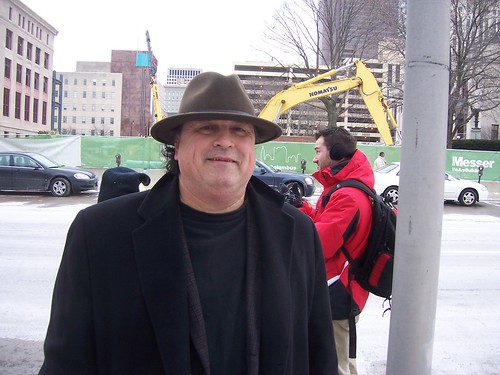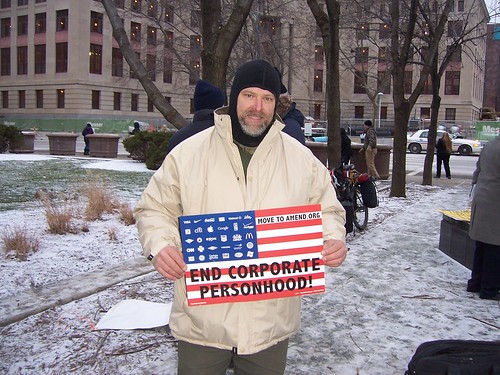Occupy the Courts, Columbus Ohio plus Cornell West at Occupy Gainsville and more
Bob Fitrakis is a journalist, attorney, and professor of political science at Columbus State Community College. He spoke with WCRS on Jan 20 at Occupy the Courts, a rally and protest against the US Supreme Court's Citizens United ruling on the second anniversary of the decision. Activists gathered said corporations are not people and money is not speech.
“ Many other democracies don’t have these problems. For example, you could require elected stakeholders, workers on every corporate board in America. Like Germany, we could require the larger ones---with more than 5,000 employees---- have half of their boards elected by their workers; and that if it’s a tie between their workers and the representatives of management, the workers get to break the tie.”
Fitrakis said corporate personhood is part of a broader issue.
“It’s the fact that our corporations are absolutely undemocratic. You got 12 people. Often these corporate directors are responsible only to a bottom line, not to the country, the community, or its workers.”
He calls for democratizing corporations.
“The first step is to say they are not people; they are legal fictions…Conservatives like to talk about states’ rights. But in the old days, you could pull a corporation’s charter if it was acting outside of what you chartered it to do.”
Fitrakis said in the past corporations existed for a period of time and then went out of business.
“The people need to control the corporations thru the state charters, and we got to say that money is not speech and corporations are not people. Then we need to restructure the corporations, because there are other ways to do it, such as 501c3s. Also, take for example, credit unions. There, you actually elect the board. We can do those things.”
Fitrakis said the US Supreme Court’s January 2010 decision in Citizens United V. Federal Election Commission has made a bad situation worse in terms of money in politics.
“ These so-called super PAC’s have money coming in anonymously. But it's really a money-laundering scheme like organized crime. They can’t coordinate with the candidate but they can be aware of what the candidate wants. And this is easy because former staffers and friends are running the super PAC’s.”
Fitrakis continued.
“It’s allowed the 1 percent of the population---who were already giving 90 percent of the money---to just openly buy elections, and in this case without transparency. We don’t even know where this money is coming from and who’s really in control of it. It’s destroying our politics.”
While at the Jan 20 Occupy the Courts event, WCRS also spoke with Dean Soltesz.
“One of my biggest gripes is that corporations are accumulating so much money and financial power that they are able to buy lobbyists or the elite members of society who will do anything for their own benefit and then take the profits they are receiving out of the United States to retire elsewhere. That’s not trickledown economics. That’s trickle out economics.”
Soltesz said big corporations are not investing in the US workforce. In an email several days later, he said , “In retaliation, I plan on advertising myself more to foreign corporations and businesses who wish to compete more effectively with American counterparts.”
'Michael on the South Side.'
We spoke at Occupy the Courts on Jan 20, as Columbus joined more than 100 cities and towns across the US to protest against the two year old US Supreme Court decision in Citizens United V Federal Election Commission. Many of those who gathered call for a constitutional amendment to clearly say a corporation is not a person and money is not speech.
“The Tea Party in Boston, more than 200 years ago was originally started to protest corporate power. The Tea Party today is being lied to by their hijacking leaders called Americans for Prosperity and the Koch brothers. These two financial entities have totally corrupted and lied to the Tea Party people."
He said there is a growing number of people in the Tea Party movement that are waking up, and realizing it’s not all about money and corporate profits.
"It’s about people. People are what’s important. People come first. The corporations will then make their money when they sell to the people. The GNP is made up mostly by the power of the people, not the corporations. We need to realize this and I just hope the people in the Tea Party Movement begin to think for themselves. Think and discern for yourself and not what Glen Beck, Rush Limbaugh, and Sean Hannity and Foxy News likes to tell you.”
He agreed that the more liberal and more progressive major news outlets also are owned by big corporations.
“Both partisan sides of the aisle have vested interests to maintain the status quo. Republicans want to maintain their power and their constituents and Democrats want to maintain their power and their constituents. But what is happening is a movement called populism that is starting to rise up in America. It’s a viewpoint that buys into neither side. It’s all about making the people first priority."
But taking aim at conservatives such as Rush Limbaugh and Sean Hannity, he said what they are not saying is what is scary and revealing.
“For one thing, they to say corporations pay enough tax and that capital gains (taxes) at 12 to 15 percent is sufficient, when in reality, Warrne Buffet, for example, his secretary paid 30-35 percent, but Warren Buffet said he only pays 9-10 percent. That just shows you that the rich who make their money off of capital gains are corrupting the system. They need to pay more. They earn their money thru capital gains. Others earn their money thru digging ditches. It doesn’t matter how you earn your money. The fact is you earn your money and you need to pay an equitable amount, like everybody else."
He said a good example of the corporate abuse of power exists in the prison system.
"They’re making money off of incarcerating people and if you noticed, there are certain groups of people that get incarcerated at higher rates and percentages for committing similar crimes such as cocaine and marijuana use. If you have lots of money, you can buy your version of justice and escape prison. But if you’re poor, you go to prison and you spend lots of time there because the profitable prison corporations get their money from the government."
As a second example of the corporate abuse of power, he mentioned for-profit healthcare.
“You look at their profit margins. Their profits are increasing, all at the expense of We the People. This is outrageous--- what’s happening. We need to put the government back into the hands of We the People thru a grassroots populist movement made up of both parties."
But he said media consolidation is the most glaring example of excessive corporate power.
“Back in 1996, we had the Communications Act that deregulated communications. It allowed TV and radio companies to buy up in similar markets multiple stations. In other words, after 1996 we began shifting the power of media into fewer and fewer hands...The corporations have totally hijacked the government by manipulating and monopolizing communication.”
He said populism, which is good in itself, can be twisted to the left or to the right in order to exploit the people of a nation.
“But when it’s governed properly and you allow the people to maintain the power. Then, hopefully we can steer it in the right direction. You got to keep money out of politics, and keep it at the lowest possible ground level you can have it at."
- Login to post comments
- Download audio file



